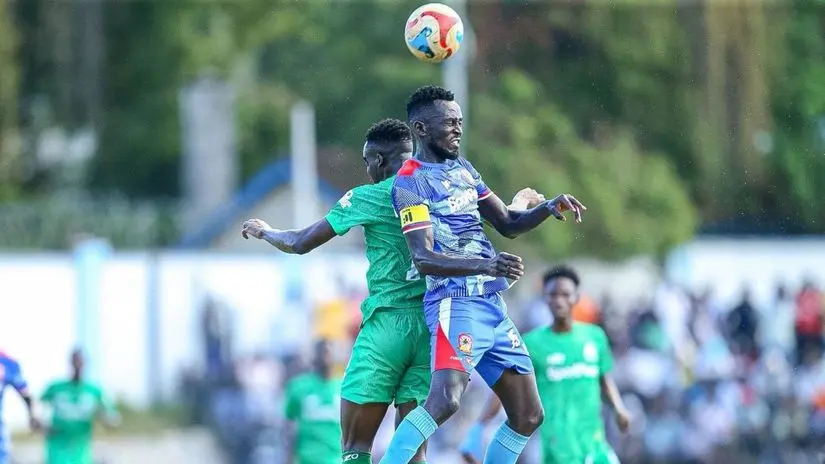Gor Mahia turned a tight tactical duel into a trophy moment with a 1-0 win over Bandari at Mbaraki Stadium, a result that sealed a piece of fresh history for the club. In the ODM@20 trophy final the decisive flash of quality arrived from the bench, and it came with a curl and a roar that silenced the port city for a second before sending the green faithful into song.
Ebenezer Adukwaw, the Ghanaian forward introduced in the second half, delivered the difference with a stunning free kick a few metres outside the area that left Levis Opiyo rooted. The strike came five minutes past the hour and it encapsulated a contest where one moment could separate two carefully set up teams. Ebenezer Adukwaw needed only one look and perfect technique to script the day.
The prize was priceless for the emotions it stirred and also rich in a more direct way for a tournament celebrating its twentieth year. Gor Mahia walked away as the inaugural winners of the ODM@20 Tournament and banked a one million cash prize, a sweet landmark for coach Charles Akonnor. It was also his first silverware since taking charge, a validation of the discipline and clarity he has tried to instill, and a message that Gor can grind and glitter in equal measure when it matters.
How the final unfolded
The opening exchanges mirrored the stakes, brisk and purposeful, with both sides probing for early control. Gor Mahia threatened first in the seventh minute when Mark Shaban met a Lawrence Juma delivery and flashed an effort just wide, a reminder that Gor’s set play precision travels well. Bandari replied through Darius Msagha, his header from a William Wadri cross sailing narrowly over as the Mombasa crowd rose in anticipation.
Gor’s best look of the half arrived from Christopher Ochieng, who rattled the crossbar after a quick transition that briefly unstitched the Bandari back line. Bandari kept testing from the flanks and through balls to Alfred Emoni, but Kevin Omondi handled the danger when called upon. The interval arrived with a goalless sheet, a fair reflection of structure over improvisation, and the sense that set pieces or a single lapse could tip the balance.
The shapes and the chess match
Bandari aligned in a classic 4-4-2 with Joseph Otieno tucking in on the left and Erickson Mulu pushing higher on the right to stretch Gor’s left flank. The center backs Shariff Amubwombe and Andrew Juma split wide in build up and invited goalkeeper Opiyo to join the first phase, then went long after luring Gor’s press. Those diagonals targeted the power of Alfred Emoni, with wingers Msagha and Hassan Abdalla hunting second balls, a plan that demanded accuracy and quick reactions in the half spaces.
Gor Mahia answered with a compact 4-1-4-1 anchored by Lawrence Juma as the lone pivot, a steady metronome between defense and midfield. Samuel Kapen started at right back, Levin Odhiambo pushed high from the left, and the central pair of Joshua Onyango and Ernest Wendo held the line. Ahead of Juma, Fidel Origa and Mark Shaban worked inside channels while Sharif Musa and George Amonoo offered width, with Ochieng stretching the last line as the striker, a framework that prized quick transitions and control of space rather than elaborate combinations.
The attacking plan tilted toward overloads on one flank followed by rapid switches to expose the far side, a pattern that created crossing lanes and loose-ball scenarios. Gor also leveraged long throws from Kapen to turn dead balls and restarts into pressure moments inside the Bandari box. The downside was occasional disconnect between midfield and the isolated striker, which meant promising counters sometimes fizzled before a final pass could be threaded.
The substitutions that swung the game
The second half introduced the first key adjustment when Bandari replaced Mulu with Rajab Omar, a move aimed at stabilizing the right. Gor then dialed up the tempo and variety with a triple change, Enock Morrison, Patrice Essombe, and Adukwaw arrived for Shaban, Amonoo, and Ochieng. The injection of fresh legs tilted the contest, Morrison offered vertical thrust, Essombe provided hold-up options, and Adukwaw attacked space between full back and center back with intent.
With those tweaks, Gor’s rest defense shifted into a two-man structure, freeing more bodies to join attacks without leaving the back door open. The back line stepped higher, compressing the pitch and improving the odds of winning second balls after clearances. It was the kind of brave recalibration that signaled the visitors were ready to seize the moment rather than wait for it.
Adukwaw’s moment of quality
In the 65th minute the final found its headline. Adukwaw was clipped just outside the area by Andrew Juma, the angle inviting a right-footed curler over the wall and into the corner. He took responsibility and delivered a free kick of sumptuous precision, the ball bending and dipping beyond Opiyo as green shirts exploded in celebration.
The physics of the strike were textbook, pace matched with spin, trajectory crafted to both clear the wall and drop late. More importantly, it captured the core truth of tight finals, when the collective margins cancel out, individual genius settles the argument. From that instant, the task was about game management and emotional control.
Bandari’s response and Gor’s resilience
Bandari reloaded from the bench with Izzadin Mohammed and Mohamed Barisa, sacrificing a measure of cover to channel more numbers forward. Geoffrey Ojunga and Said Tsuma kept trying to thread the midfield needle, and Wadri drifted into pockets to combine and release the wide players. Territory tilted toward the home side, the ball living longer in Gor’s half, yet clear chances remained scarce.
Gor Mahia accepted the new script, dropped into a deeper block, and used smart fouls and quick restarts to break Bandari’s rhythm. Kevin Omondi stayed calm under crosses, the center backs attacked first contact, and Juma plugged passing lanes in front of them. Late pushes through David Sakwa and Ojunga were repelled by a compact shape that refused to crack, a portrait of control under pressure that brought the finish line closer with every clearance.
| CASINO | BONUS | INFO | RATING | |
|---|---|---|---|---|
|
bonus
100% match bonus up to $500 for new users!
See 6 Bonuses
|
info
Lots of bonuses, 3,000+ games, instant-play & fast payouts No.1668 / JAZ |
|||
|
bonus
Welcome package: 190000 KES + 150 FS!
See 12 Bonuses
|
info
Experience the thrill of our casino! Spin, win, and enjoy top-notch games anytime ALSI-202411073-FI2 |
|||
|
bonus
50% bonus on second deposit!
See 18 Bonuses
|
info
Mobile friendly with 24 support & Curacao license and a lot of bonuses |
|||
|
bonus
Join VIP Club for exclusive rewards!
See 4 Bonuses
|
info
High RTP of 97%, crypto-ready payments, top providers ALSI-202410011-FI1 |
From Shabana scare to silverware
The road to this coronation ran through a semi that reminded Gor Mahia of both their strengths and their vulnerabilities. Against Shabana, Gor led through a crisp strike before Humphrey Obina equalized with a free kick after Victor Omondi drew a foul from Joshua Onyango, and the tie finished 1-1. The resolution came in a penalty shootout where composure spoke loudest, Adukwaw converted, and Enock Morrison buried the decider to book the date with Bandari.
That rehearsal in nerve management clearly traveled to Mbaraki. When Bandari applied late heat, Gor never panicked, instead they leaned on the discipline that had seen them withstand Shabana’s transitions. In back-to-back knockout tests, the theme held, survive the storms, wait for the window, deliver when it opens.
Key moments in Mbaraki
- Seventh minute, Mark Shaban flashed wide from a Lawrence Juma delivery,
- Darius Msagha headed over from a William Wadri cross as Bandari responded,
- Christopher Ochieng struck the crossbar after Gor sprung a quick transition,
- Bandari threatened through Geoffrey Ojunga and Alfred Emoni but could not find the finish,
- Sixty fifth minute, Adukwaw won a foul then curled the winning free kick past Levis Opiyo,
- Final minutes, Bandari pressed through David Sakwa and Ojunga, Gor saw it out to claim the title.
What the win means
Gor Mahia are the first name on the ODM@20 roll of honor, a distinction that pairs prestige with a tangible reward. The champions banked one million in prize money, Bandari earned Kshs 700,000 as runners-up, Shabana took Kshs 500,000 for third, and AFC Leopards received Kshs 250,000 for fourth. For a preseason style cup with competitive intensity, those sums add real incentive and narrative spice.
For Charles Akonnor, this is a foundation stone. The performance validated his willingness to adjust shapes, trust the bench, and lean on structure while still allowing match winners the freedom to decide moments. For the group, the trophy offers confidence and a reference point for how to close out tight games.
Tactical lessons for the FKFPL grind
Gor’s 4-1-4-1, with Juma anchoring and Odhiambo advancing from left back, can dominate territory when the spacing between the striker and midfield remains tight. The triple change showed the value of rotational depth and the courage to alter the game’s geometry before the hour. Set pieces and long throws are a major weapon for this team, and the final reinforced that investing in dead ball detail can decide silverware.
Bandari’s 4-4-2 offered a sensible mix, split center backs to entice pressure, then hit diagonals toward Emoni with wingers alive for second balls. When they shifted to a more aggressive stance, they seized territory but struggled to pair volume with precision in the final pass. The blueprint is competitive, and with marginal gains in timing and delivery around the box, they will trouble any back line.
Standout performers
Adukwaw takes the headline for the winning strike, a substitute who read the game’s pulse and imposed his will on it. Kevin Omondi stood firm when Bandari launched aerial traffic, his positioning and handling brought calm at important moments. Lawrence Juma knitted phases and covered gaps, the quiet glue of the midfield that made Gor’s structural tweaks work.
For Bandari, Ojunga and Tsuma balanced screening with progression, always offering angles for the back line. Wadri’s movement between lines caused problems and opened space for Msagha and Abdalla to attack. Alfred Emoni battled for every long diagonal, and although the final touch eluded him, his duel work sustained Bandari’s strategy.
The last word
Finals do not always deliver fireworks, sometimes they reward the team that marries patience with punch. Gor Mahia did exactly that in the ODM@20 trophy final, they trusted their shape, trusted their bench, and trusted a special left boot to tilt the story. In Mombasa on Friday afternoon, that trust became a cup, a cash windfall, and a statement that the green machine is already in tune for the challenges to come.










